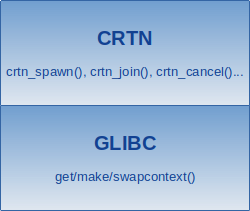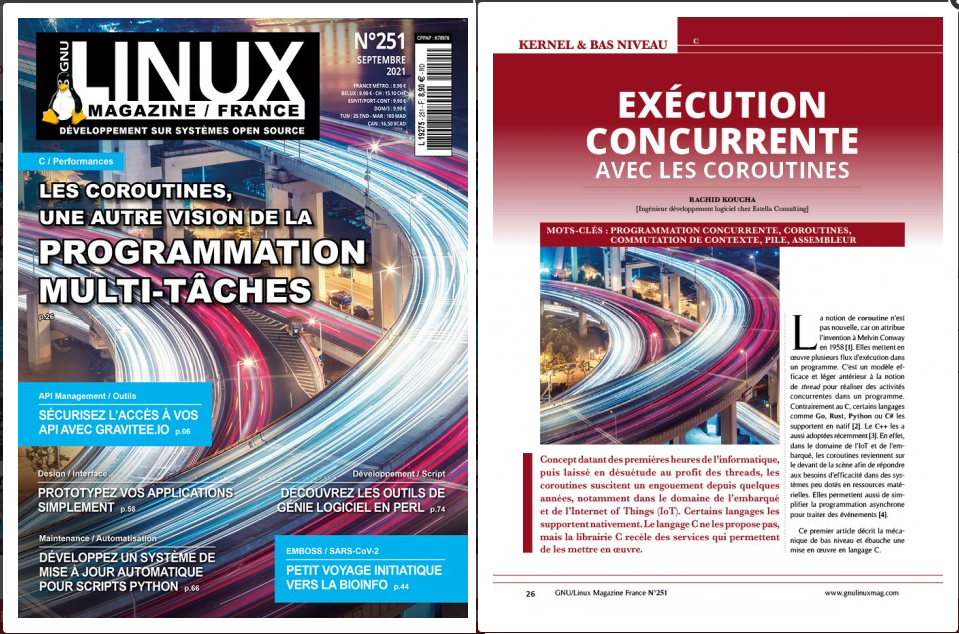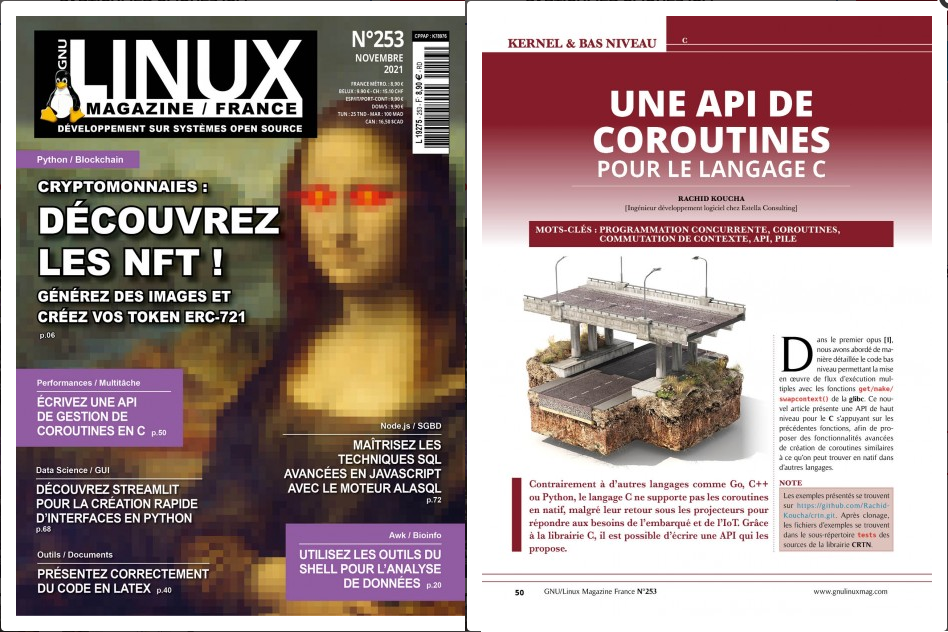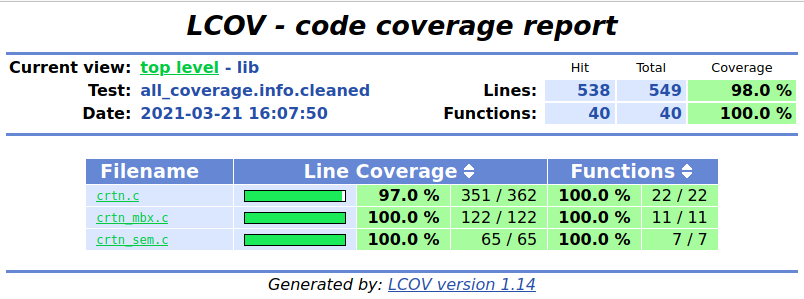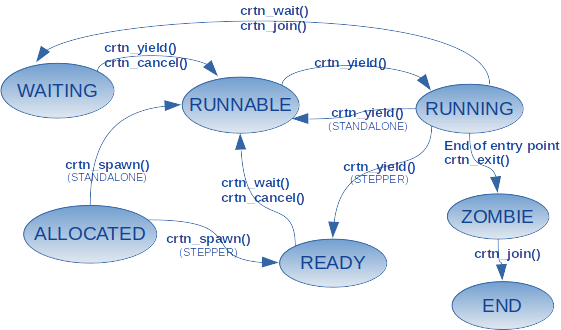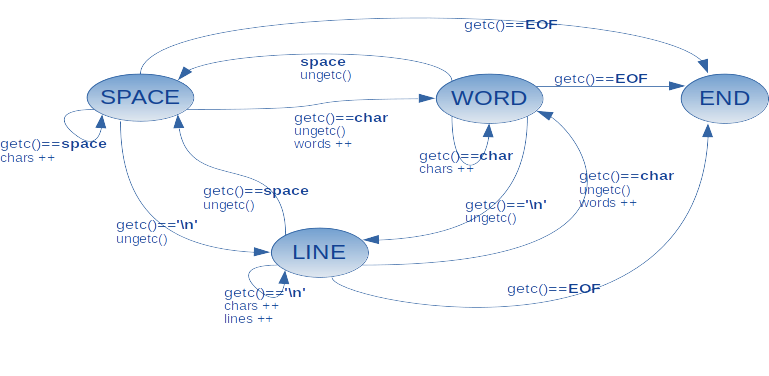1 Introduction
2 Maintainers
3 Download
4 Administration with cmake
4.1 Configuration
4.2 Build
4.3 Installation
4.4 Tests
4.5 Tests coverage
4.6 Packaging
4.7 Cross-compiling
5 Administration with crtn_install.sh
5.1 crtn_install.sh script
5.2 Build, installation, cleanup
5.3 Tests
5.4 Tests coverage
5.5 Packaging
5.6 Cross-compiling
6 Usage
6.1 Online manuals
6.2 Overview of the API
6.3 Examples
6.3.1 Generator
6.3.2 Producer/Consumer
6.4 Configuration environment variables
7 Performance considerations
Annexes
A.1 Notes about RPM package
A.2 Notes about DEB package
CoRouTiNe (crtn) is an API providing coroutines
in C language programs. They are concurrent execution flows that can be suspended or resumed
under the control of the user. The underlying operating system has no idea of their existence.
The service is an abstraction layer implemented as a shared library on top of GLIBC:
crtn is distributed under the GNU LGPL license.
The current document concerns crtn version 0.2.5.
Two articles have been published in french in the issues number 251 and 253 of GNU Linux Magazine France:
To report bugs or suggestions, please contact me
The source code is available on github. To clone it:
$ git clone https://github.com/Rachid-Koucha/crtn.git
To get the source code of the 0.2.5 version:
$ cd crtn
crtn$ git checkout tags/v0.2.5
The source tree is:
In the following paragraphs, we suppose that the source code tree is located in $HOME/crtn.
To avoid the pollution of the source code tree with the build artifacts, it is preferable to make an out of source configuration and build. So, we create a build directory from which all the configuration/build operations will be done. In the the following sections, we use /tmp/crtn_build:
$ mkdir /tmp/crtn_build
$ cd /tmp/crtn_build
/tmp/crtn_build$
To configure the build:
/tmp/crtn_build$ ls
/tmp/crtn_build$ cmake $HOME/crtn
[...]
-- Configuring CRTN version 0.2.5
[...]
-- Build files have been written to: /tmp/crtn_build
/tmp/crtn_build$ ls
CMakeCache.txt CMakeFiles CPackConfig.cmake [...]
Some optional services can be set by cmake variables:
/tmp/crtn_build$ cmake -LH
[...]
// Mailbox service
HAVE_CRTN_MBX:BOOL=OFF
// Semaphore service
HAVE_CRTN_SEM:BOOL=OFF
To configure the package with the optional mailbox and semaphore services:
/tmp/crtn_build$ cmake -DHAVE_CRTN_MBX=ON -DHAVE_CRTN_SEM=ON $HOME/crtn
-- Configuring CRTN version 0.2.5
[...]
-- Build files have been written to: /tmp/crtn_build
/tmp/crtn_build$ cmake -LH
[...]
// Mailbox service
HAVE_CRTN_MBX:BOOL=ON
// Semaphore service
HAVE_CRTN_SEM:BOOL=ON
To build the software:
/tmp/crtn_build$ make
[ 1%] Building C object lib/CMakeFiles/crtn.dir/crtn.c.o
[ 3%] Building C object lib/CMakeFiles/crtn.dir/crtn_mbx.c.o
[...]
/tmp/crtn_build$ ls lib
[...]libcrtn.so libcrtn.so.0 libcrtn.so.0.2.5
To clean the built files:
/tmp/crtn_build$ make clean
/tmp/crtn_build$ ls lib
CMakeFiles Makefile cmake_install.cmake
To install the software in the default /usr/local directory:
/tmp/crtn_build$ sudo make install
/tmp/crtn_build$ ls -l /usr/local/lib/libcrtn.so*
lrwxrwxrwx 1 root root 12 mars 21 12:04 /usr/local/lib/libcrtn.so -> libcrtn.so.0
lrwxrwxrwx 1 root root 16 mars 21 12:04 /usr/local/lib/libcrtn.so.0 -> libcrtn.so.0.2.5
-r--r--r-- 1 root root 60040 mars 21 12:04 /usr/local/lib/libcrtn.so.0.2.5
/tmp/crtn_build$ ls -l /usr/local/share/man/man3/crtn*
-r--r--r-- 1 root root 2786 mars 21 12:04 /usr/local/share/man/man3/crtn.3.gz
-r--r--r-- 1 root root 55 mars 21 12:04 /usr/local/share/man/man3/crtn_attr_delete.3.gz
-r--r--r-- 1 root root 52 mars 21 12:04 /usr/local/share/man/man3/crtn_attr_new.3.gz
-r--r--r-- 1 root root 50 mars 21 12:04 /usr/local/share/man/man3/crtn_cancel.3.gz
[...]
/tmp/crtn_build$ ls -l /usr/local/share/man/man7/crtn*
-r--r--r-- 1 root root 1436 mars 21 12:04 /usr/local/share/man/man7/crtn.7.gz
To uninstall the software:
/tmp/crtn_build$ sudo make uninstall
/tmp/crtn_build$ ls -l /usr/local/share/man/man3/crtn*
ls: cannot access '/usr/local/share/man/man3/crtn*': No such file or directory
To launch the regression tests, check package must be available on the system.
The tests can be triggered through cmake's test target:
/tmp/crtn_build$ make test
Running tests...
Test project /tmp/crtn_build
Start 1: crtn_tests
1/1 Test #1: crtn_tests ....................... Passed 22.03 sec
100% tests passed, 0 tests failed out of 1
Total Test time (real) = 22.03 sec
The logs are located in Testing sub-directory:
/tmp/crtn_build$ ls Testing
Temporary
/tmp/crtn_build$ ls Testing/Temporary
CTestCostData.txt LastTest.log
The tests can also be triggered by calling directly the executable in tests sub-directory:
/tmp/crtn_build$ tests/check_all
Running suite(s): CRTN tests
[...]
100%: Checks: 32, Failures: 0, Errors: 0
To measure the tests coverage, the gcov/lcov packages are required. For example, here is the test coverage with the semaphore/mailbox optional services:
/tmp/crtn_build$ make clean
/tmp/crtn_build$ cmake -DHAVE_CRTN_MBX=ON -DHAVE_CRTN_SEM=ON -DCMAKE_COVERAGE=1 -DCMAKE_BUILD_TYPE=Debug $HOME/crtn
-- Configuring CRTN version 0.2.5
CMAKE_C_COMPILER_ID=GNU
-- Appending code coverage compiler flags: -g -O0 --coverage -fprofile-arcs -ftest-coverage
[...]
/tmp/crtn_build$ make
-- Configuring CRTN version 0.2.5
CMAKE_C_COMPILER_ID=GNU
-- Appending code coverage compiler flags: -g -O0 --coverage -fprofile-arcs -ftest-coverage
[...]
/tmp/crtn_build$ make all_coverage
[...]
Running suite(s): CRTN tests
100%: Checks: 31, Failures: 0, Errors: 0
Capturing coverage data from .
[...]
Overall coverage rate:
lines......: 95.8% (527 of 550 lines)
functions..: 100.0% (40 of 40 functions)
Open .../all_coverage/index.html in your browser to view the coverage report.
[100%] Built target all_coverage
The resulting /tmp/crtn_build/all_coverage/index.html file can be viewed in a browser to get something like this:
To generate the Debian (deb), Red-Hat Package Manager (rpm), Tar GZipped (tgz) and Self Extracting Tar GZipped (stgz) binary packages with the semaphore/mailbox optional services:
/tmp/crtn_build$ make clean
/tmp/crtn_build$ cmake -DHAVE_CRTN_MBX=ON -DHAVE_CRTN_SEM=ON -DCPACK_GENERATOR="DEB;RPM;TGZ;STGZ" -DCMAKE_INSTALL_PREFIX=/usr/local $HOME/crtn
/tmp/crtn_build$ make
/tmp/crtn_build$ make package
[...]
CPack: - package: .../crtn/crtn_0.2.5_amd64.deb generated.
[...]
Pack: - package: .../crtn/crtn-0.2.5-1.x86_64.rpm generated.
[...]
CPack: - package: .../crtn/crtn-0.2.5-Linux-crtn.tar.gz generated.
[...]
CPack: - package: .../crtn/crtn-0.2.5-Linux-crtn.sh generated.
To cross-compile with cmake, a toolchain file is required. Some examples are
provided in cmake/toolchains from the top level of the source tree.
For an ARM 32 bits build when crossbuild-essential-armhf is installed::
/tmp/crtn_build$ make clean
/tmp/crtn_build$ rm CMakeCache.txt
/tmp/crtn_build$ cmake -DCMAKE_TOOLCHAIN_FILE=$HOME/crtn/cmake/toolchains/arm-linux-gnueabihf.cmake -DHAVE_CRTN_MBX=ON -DHAVE_CRTN_SEM=ON $HOME/crtn
-- The C compiler identification is GNU 9.3.0
-- Check for working C compiler: /usr/bin/arm-linux-gnueabihf-gcc
-- Check for working C compiler: /usr/bin/arm-linux-gnueabihf-gcc -- works
[...]
/tmp/crtn_build$ make
[ 1%] Building C object lib/CMakeFiles/crtn.dir/crtn.c.o
[ 3%] Building C object lib/CMakeFiles/crtn.dir/crtn_mbx.c.o
[...]
/tmp/crtn_build$ file lib/libcrtn.so.0.2.5
lib/libcrtn.so.0.2.5: ELF 32-bit LSB shared object, ARM, EABI5 version 1 (SYSV), dynamically linked, BuildID[sha1]=9a719ea0ab44ecffe6100f146f08fb6cf6b57e63, with debug_info, not stripped
For an ARM 64 bits build when crossbuild-essential-arm64 is installed:
/tmp/crtn_build$ make clean
/tmp/crtn_build$ rm CMakeCache.txt
/tmp/crtn_build$ cmake -DCMAKE_TOOLCHAIN_FILE=$HOME/crtn/cmake/toolchains/aarch64-linux-gnu.cmake -DHAVE_CRTN_MBX=ON -DHAVE_CRTN_SEM=ON $HOME/crtn
-- The C compiler identification is GNU 9.3.0
-- Check for working C compiler: /usr/bin/aarch64-linux-gnu-gcc
-- Check for working C compiler: /usr/bin/aarch64-linux-gnu-gcc -- works
[...]
/tmp/crtn_build$ make
Scanning dependencies of target crtn
[ 1%] Building C object lib/CMakeFiles/crtn.dir/crtn.c.o
[ 3%] Building C object lib/CMakeFiles/crtn.dir/crtn_mbx.c.o
[...]
/tmp/crtn_build$ file lib/libcrtn.so.0.2.5
lib/libcrtn.so.0.2.5: ELF 64-bit LSB shared object, ARM aarch64, version 1 (SYSV), dynamically linked, BuildID[sha1]=6a60c0908cb8f4b94827418dbfa17eebf556b9fa, with debug_info, not stripped
This shell script is a swiss army knife to make several things. It implicitly uses cmake.
The tool is to be used from the top level of the source tree. In the following paragraphs,
we suppose that the source code tree is located in $HOME/crtn.
To display the help, use the -h option:
$ cd $HOME/crtn
$HOME/crtn$ ./crtn_install.sh -h
Usage:
crtn_install.sh [-c] [-T|-C [browser]] [-d install_dir] [-o MBX|SEM] [-I] [-U]
[-B] [-A] [-P RPM|DEB|TGZ|STGZ] [-b build_dir] [-X toolchain] [-h]
-c : Cleanup built objects
-C [browser]: Measure the test coverage (results are displayed with 'browser')
-T : Launch the regression tests
-d : Installation directory (default: /usr/local)
-P RPM|DEB|TGZ|STGZ: Generate packages
-B : Build the software
-b build_dir: Build directory (default: build)
-I (*): Install the software
-U (*): Uninstall the software
-A : Generate an archive of the software (sources)
-o : Add MBX|SEM service
-X toolchain: Cross-build with a given toolchain file
-h : this help
(*) Super user rights required
Note that some options require super user privileges. Use sudo for example.
To avoid the pollution of the source code tree with build artifacts, it is preferable to make
an out of source configuration and build. The build directory is specified with the -b option.
By default, a sub-directory called build is created by the tool at the top level of the source tree.
To clean everything, go to the top level of the source tree:
$HOME/crtn$ ./crtn_install.sh -c
To build the library:
$HOME/crtn$ ./crtn_install.sh -B
$HOME/crtn$ ls build
[...]include lib man tests
$HOME/crtn$ ls build/lib
[...]libcrtn.so libcrtn.so.0 libcrtn.so.0.2.5
If mailbox and/or semaphores services are required, add the corresponding options on the command line:
$HOME/crtn$ ./crtn_install.sh -B -o mbx -o sem
For a complete installation in the default /usr/local subtree (super user rights required):
$HOME/crtn$ sudo ./crtn_install.sh -I
$HOME/crtn$ ls -l /usr/local/lib/libcrtn.so*
lrwxrwxrwx 1 root root 12 mars 21 12:04 /usr/local/lib/libcrtn.so -> libcrtn.so.0
lrwxrwxrwx 1 root root 16 mars 21 12:04 /usr/local/lib/libcrtn.so.0 -> libcrtn.so.0.2.5
-r--r--r-- 1 root root 60040 mars 21 12:04 /usr/local/lib/libcrtn.so.0.2.5
$HOME/crtn$ ls -l /usr/local/share/man/man3/crtn*
-r--r--r-- 1 root root 2786 mars 21 12:04 /usr/local/share/man/man3/crtn.3.gz
-r--r--r-- 1 root root 55 mars 21 12:04 /usr/local/share/man/man3/crtn_attr_delete.3.gz
-r--r--r-- 1 root root 52 mars 21 12:04 /usr/local/share/man/man3/crtn_attr_new.3.gz
-r--r--r-- 1 root root 50 mars 21 12:04 /usr/local/share/man/man3/crtn_cancel.3.gz
[...]
$HOME/crtn$ ls -l /usr/local/share/man/man7/crtn*
-r--r--r-- 1 root root 1436 mars 21 12:04 /usr/local/share/man/man7/crtn.7.gz
To uninstall the software (super user rights required):
$HOME/crtn$ sudo ./crtn_install.sh -U
$HOME/crtn$ ls -l /usr/local/share/man/man7/crtn*
ls: cannot access '/usr/local/share/man/man7/crtn*': No such file or directory
To cleanup every build artifacts to go back to original source tree:
$HOME/crtn$ ./crtn_install.sh -c
Removing 'build' directory
The regression tests are based on check package. The latter must be installed prior launching the tests.
To trigger the regression tests for the whole software (i.e. with the optional mailbox and semaphore services):
$HOME/crtn$ ./crtn_install.sh -T -o mbx -o sem
[...]
100%: Checks: 32, Failures: 0, Errors: 0
To measure the test coverage, the gcov/lcov packages are required.
The test coverage of crtn with a display of the result in firefox:
$HOME/crtn$ ./crtn_install.sh -C firefox
The same with the semaphore/mailbox optional services:
$HOME/crtn$ ./crtn_install.sh -C firefox -o mbx -o sem
This shows something like this in the browser:
To make a tar gzip source package, use the -A option of crtn_install.sh:
$HOME/crtn$ ./crtn_install.sh -A
[...]
Building archive build/crtn_src-0.2.5.tgz...
It is also possible to generate Debian (deb), Red-Hat Package Manager (rpm), Tar GZipped (tgz) and Self Extracting Tar GZipped (stgz) binary packages:
$HOME/crtn$ ./crtn_install.sh -c -P tgz -P rpm -P deb -P stgz
This makes the following binary packages in the build sub-directory:
- crtn_0.2.5_amd64.deb (deb)
- crtn-0.2.5-1.x86_64.rpm (rpm)
- crtn-0.2.5-Linux-crtn.tar.gz (tgz)
- crtn-0.2.5-Linux-crtn.sh (stgz)
To cross-compile with cmake, a toolchain file is required. Some examples are
provided in cmake/toolchains from the top level of the source tree.
For an ARM 32 bits build when crossbuild-essential-armhf is installed:
$HOME/crtn$ ./crtn_install.sh -X $HOME/crtn/cmake/toolchains/arm-linux-gnueabihf.cmake -o sem -o mbx
-- The C compiler identification is GNU 9.3.0
-- Check for working C compiler: /usr/bin/arm-linux-gnueabihf-gcc
-- Check for working C compiler: /usr/bin/arm-linux-gnueabihf-gcc -- works
[...]
$HOME/crtn$ file build/lib/libcrtn.so.0.2.5
lib/libcrtn.so.0.2.5: ELF 32-bit LSB shared object, ARM, EABI5 version 1 (SYSV), dynamically linked, BuildID[sha1]=9a719ea0ab44ecffe6100f146f08fb6cf6b57e63, with debug_info, not stripped
For an ARM 64 bits build when crossbuild-essential-arm64 is installed:
$HOME/crtn$ ./crtn_install.sh -X $HOME/crtn/cmake/toolchains/arch64-linux-gnu.cmake -o sem -o mbx
Removing 'build' directory
-- The C compiler identification is GNU 9.3.0
-- Check for working C compiler: /usr/bin/aarch64-linux-gnu-gcc
-- Check for working C compiler: /usr/bin/aarch64-linux-gnu-gcc -- works
[...]
$HOME/crtn$ file build/lib/libcrtn.so.0.2.5
lib/libcrtn.so.0.2.5: ELF 64-bit LSB shared object, ARM aarch64, version 1 (SYSV), dynamically linked, BuildID[sha1]=6a60c0908cb8f4b94827418dbfa17eebf556b9fa, with debug_info, not stripped
Once crtn is installed, it is possible to access the corresponding online manuals with:
$ man 7 crtn # Overview of crtn and configuration environment variables
$ man 3 crtn # Manual of crtn API
$ man 3 crtn_mbx # Manual of crtn mailbox service
$ man 3 crtn_sem # Manual of crtn semaphore service
The latters provide some small example programs in their EXAMPLES section.
The functions of the API are similar to the pthread's one.
A coroutine is created with crtn_spawn(). The latter returns a unique coroutine identifier (cid).
The coroutines have several attributes set with the crtn_set_attr_xxx() services:
- Two types of coroutines are provided: stackless and stackful (default).
- Two scheduling types are provided: stepper and standalone (default). At startup, a stepper coroutine is suspended whereas a standalone coroutine is always runnable.
A coroutine suspends itself calling crtn_yield(). It is resumed when another coroutine calls crtn_yield() if it is standalone or crtn_wait() if it is stepper.
A stepper coroutine can pass the address of some data to crtn_yield(). The coroutine waiting for it, gets those data with the pointer passed to crtn_wait().
A coroutine terminates when it reaches the end of its entry point, when it calls crtn_exit() or when another coroutine calls crtn_cancel() to finish it.
A terminated coroutine stays in a zombie state until another coroutine calls crtn_join() to get its termination status and to implicitly free the corresponding internal data structures. The latter is an integer with a user defined signification.
The state diagram of a coroutine is depicted in the following figure:
The scheduling is FIFO oriented. Any coroutine becoming runnable, is put at the beginning of the list. Any running (standalone) coroutine yielding the CPU goes at the end of the list. This minimizes CPU starvation.
Additional inter-coroutine communication and synchronization are optionally provided with the -o option of the crtn_install.sh script or the HAVE_CRTN_MBX/SEM cmake defines:
- The mailboxes (
crtn_mbx_new(),crtn_mbx_post(),crtn_mbx_get()...) with-o mbxor-DHAVE_CRTN_MBX=ON; - The semaphores (
crtn_sem_new(),crtn_sem_p(),crtn_sem_v()...) with-o semor-DHAVE_CRTN_SEM=ON.
Coroutines are well-suited for implementing generators.
In the following example, the main coroutine creates a secondary coroutines with the stepper attribute and resumes it every seconds. The secondary coroutine generates the following term of the fibonacci sequence each time it is resumed by the main coroutine. The term is passed through crtn_wait().
#include <errno.h>
#include <stdio.h>
#include <unistd.h>
#include <signal.h>
#include <limits.h>
#include <crtn.h>
static int signaled;
static void hdl_sigint(int sig)
{
printf("Signal %d...\n", sig);
signaled = 1;
} // hdl_sigint
static int fibonacci(void *param)
{
unsigned long long prevn_1;
unsigned long long prevn;
unsigned long long cur;
(void)param;
start:
cur = prevn_1 = 0;
crtn_yield(&cur);
cur = prevn = 1;
crtn_yield(&cur);
while (1) {
// Check overflow
if ((ULLONG_MAX - prevn_1) < prevn) {
goto start;
}
cur = prevn + prevn_1;
crtn_yield(&cur);
prevn_1 = prevn;
prevn = cur;
}
return 0;
} // fibonacci
int main(void)
{
crtn_t cid;
int rc;
int status;
unsigned long long *seq;
crtn_attr_t attr;
unsigned int i;
signal(SIGINT, hdl_sigint);
attr = crtn_attr_new();
if (!attr) {
errno = crtn_errno();
fprintf(stderr, "crtn_attr_new(): error '%m' (%d)\n", errno);
return 1;
}
rc = crtn_set_attr_type(attr, CRTN_TYPE_STEPPER);
if (rc != 0) {
errno = crtn_errno();
fprintf(stderr, "crtn_set_attr_type(): error '%m' (%d)\n", errno);
return 1;
}
rc = crtn_spawn(&cid, "Fibonacci", fibonacci, 0, attr);
if (rc != 0) {
errno = crtn_errno();
fprintf(stderr, "crtn_spawn(): error '%m' (%d)\n", errno);
return 1;
}
rc = crtn_attr_delete(attr);
if (rc != 0) {
errno = crtn_errno();
fprintf(stderr, "crtn_attr_delete(): error '%m' (%d)\n", errno);
return 1;
}
i = 0;
while(1) {
rc = crtn_wait(cid, (void **)&seq);
if (rc != 0) {
errno = crtn_errno();
fprintf(stderr, "crtn_wait(%d): error '%m' (%d)\n", cid, errno);
return 1;
}
printf("seq[%u]=%llu\n", i, *seq);
i ++;
sleep(1);
if (signaled) {
break;
}
} // End while
rc = crtn_cancel(cid);
if (rc != 0) {
errno = crtn_errno();
fprintf(stderr, "crtn_cancel(%d): error '%m' (%d)\n", cid, errno);
return 1;
}
rc = crtn_join(cid, &status);
if (rc != 0) {
errno = crtn_errno();
fprintf(stderr, "crtn_join(%d): error '%m' (%d)\n", cid, errno);
return 1;
}
return status;
} // mainBuild:
$ gcc fibonacci.c -o fibonacci -lcrtn
Execution:
$ ./fibonacci
seq[0]=0
seq[1]=1
seq[2]=1
seq[3]=2
seq[4]=3
seq[5]=5
seq[6]=8
seq[7]=13
seq[8]=21
seq[9]=34
seq[10]=55
seq[11]=89
seq[12]=144
seq[13]=233
^CSignal 2...
Many other example programs are available in the tests sub-directory of the source code tree.
Coroutines are well-suited for implementing cooperating tasks in event-driven applications.
The following is an example of producer/consumer program reimplementing the shell's wc program to count the
lines, words and characters from the standard input. The behaviour of the program is depicted in the following
diagram:
The main coroutine (the producer) reads stdin in non blocking mode (nb_read() function) and fills a buffer
with the fill_buffer() function. The function relinquishes the CPU when data are written in the buffer. This
resumes the other coroutines.
Each state of the above diagram are implemented with coroutines (the consumers) which merely read the buffer (with read_buffer()
function) and relinquish the CPU as soon as the read character is not accepted in the corresponding state. The
latter is put back in the buffer (with unread_buffer() function).
The coroutines finish when they encounter EOF.
The buffer looks like a pipe between the producer and the consumers. The producer increments a write pointer and the consumers increment a read pointer. The buffer is empty when both pointers are equal.
Concerning the scheduling, all the coroutines are standalone. They don't resume explicitly any other
coroutine. They cooperate implicitly by calling crtn_yield() whenever characters are added in the buffer
(for the producer) and the read character is not accepted or the read pointer reaches the write pointer
(for the consumers). For the latters, this works because any character is accepted in only one state. So, if
a consumer coroutine is resumed and encounters an unaccepted character, it suspends itself immediately to
resume any other coroutine. When resumed, the producer suspends itself if the read pointer is not equal to the
write one.
No semaphore is needed as the coroutines run concurrently but not in parallel.
#include <errno.h>
#include <stdio.h>
#include <ctype.h>
#include <assert.h>
#include <sys/select.h>
#include <unistd.h>
#include "crtn.h"
static int w_offset, r_offset;
#define BUFFER_SIZE 128
static char buffer[BUFFER_SIZE];
struct counter_t
{
size_t nb_chars;
size_t nb_spaces;
size_t nb_words;
size_t nb_lines;
};
struct counter_t cnts;
//----------------------------------------------------------------------------
// Name : nb_read
// Description : Non blocking read
// Return : Number of read bytes if OK
// -1, if error
// -2, timeout
// -3, EOF
//----------------------------------------------------------------------------
int nb_read(int fd, char *buf, size_t bufsz, unsigned long to_ms)
{
int rc;
fd_set fdset;
int nfds = fd + 1;
struct timeval to;
to.tv_sec = 0;
to.tv_usec = to_ms * 1000;
while(1) {
FD_ZERO(&fdset);
FD_SET(fd, &fdset);
rc = select(nfds, &fdset, NULL, NULL, &to);
switch (rc) {
// Error
case -1 : {
// Interrupted system call ?
if (EINTR != errno) {
return -1;
}
}
break;
// Timeout
case 0: {
return -2;
}
break;
// Incoming data
default : {
rc = read(fd, buf, bufsz);
// Error ?
if (rc < 0) {
return -1;
}
// EOF ?
if (0 == rc) {
return -3;
}
// Data
return rc;
}
break;
} // End switch
} // End while
} // nb_read
static int read_buffer(void)
{
if (r_offset == w_offset) {
crtn_yield(0);
}
cnts.nb_chars ++;
return buffer[r_offset ++];
} // read_buffer
#define unread_buffer(c) do { \
assert(r_offset > 0); \
-- r_offset; \
cnts.nb_chars --; \
} while(0)
static int fill_buffer(void)
{
int rc;
unsigned long to;
size_t size;
to = 0;
while(1) {
do {
if (w_offset) {
// If buffer is empty, reset the pointers
if (w_offset == r_offset) {
w_offset = r_offset = 0;
}
}
size = BUFFER_SIZE - w_offset;
// There is still some space behind the write pointer, tries to fill
// it with additional input data
if (size) {
rc = nb_read(0, &(buffer[w_offset]), size, to);
to = 0;
} else {
// The wrtie pointer is at the end of the buffer and there
// are still remaining data to read
crtn_yield(0);
}
} while(size == 0);
switch(rc) {
case -1: {
// Error
buffer[w_offset] = EOF; // Trigger the end of the coroutines
w_offset ++;
crtn_yield(0);
return -1;
}
break;
case -2: {
// Timeout
if (w_offset > r_offset) {
// There are still data to read in the buffer
crtn_yield(0);
} else {
// Buffer empty, wait for more input data
to = 250; // Polling 250 ms
}
}
break;
case -3: {
// EOF
buffer[w_offset] = EOF; // Trigger the end of the coroutines
w_offset ++;
crtn_yield(0);
return 0;
}
break;
default: {
// New data
w_offset += rc;
crtn_yield(0);
}
break;
} // End switch
} // End while
} // fill_buffer
static int get_spaces(void *p)
{
int c;
(void)p;
do {
c = read_buffer();
while(isspace(c) && (c != '\n') && (c != EOF)) {
cnts.nb_spaces ++;
c = read_buffer();
}
unread_buffer(c);
if (c == EOF) {
break;
}
crtn_yield(0);
} while(1);
return 0;
} // get_spaces
static int get_word(void *p)
{
int c;
size_t count;
(void)p;
do {
count = cnts.nb_chars;
c = read_buffer();
while(!isspace(c) && (c != EOF)) {
c = read_buffer();
}
unread_buffer(c);
if (cnts.nb_chars > count) {
cnts.nb_words ++;
}
if (c == EOF) {
break;
}
crtn_yield(0);
} while(1);
return 0;
} // get_word
static int get_lines(void *p)
{
int c;
(void)p;
do {
c = read_buffer();
while((c == '\n') && (c != EOF)) {
cnts.nb_lines ++;
c = read_buffer();
}
unread_buffer(c);
if (c == EOF) {
break;
}
crtn_yield(0);
} while(1);
return 0;
} // get_lines
int main(void)
{
crtn_t cid_word, cid_spaces, cid_lines;
int rc;
int status;
int exit_code;
rc = crtn_spawn(&cid_word, "word", get_word, 0, 0);
if (rc != 0) {
errno = crtn_errno();
fprintf(stderr, "crtn_spawn(): error '%m' (%d)\n", errno);
return 1;
}
rc = crtn_spawn(&cid_lines, "lines", get_lines, 0, 0);
if (rc != 0) {
errno = crtn_errno();
fprintf(stderr, "crtn_spawn(): error '%m' (%d)\n", errno);
return 1;
}
rc = crtn_spawn(&cid_spaces, "space", get_spaces, 0, 0);
if (rc != 0) {
errno = crtn_errno();
fprintf(stderr, "crtn_spawn(): error '%m' (%d)\n", errno);
return 1;
}
exit_code = 0;
rc = fill_buffer();
if (rc != 0) {
fprintf(stderr, "Input error '%m' (%d)\n", errno);
exit_code = 1;
}
rc = crtn_join(cid_word, &status);
if (rc != 0) {
errno = crtn_errno();
fprintf(stderr, "crtn_join(): error '%m' (%d)\n", errno);
exit_code = 1;
}
rc = crtn_join(cid_spaces, &status);
if (rc != 0) {
errno = crtn_errno();
fprintf(stderr, "crtn_join(): error '%m' (%d)\n", errno);
exit_code = 1;
}
rc = crtn_join(cid_lines, &status);
if (rc != 0) {
errno = crtn_errno();
fprintf(stderr, "crtn_join(): error '%m' (%d)\n", errno);
exit_code = 1;
}
printf("Lines: %zu / Words: %zu / Spaces: %zu / Characters: %zu\n"
,
cnts.nb_lines, cnts.nb_words, cnts.nb_spaces, cnts.nb_chars
);
return exit_code;
} // mainBuild:
$ gcc mywc.c -o mywc -lcrtn
Execution:
$ > foo
$ cat foo | wc
0 0 0
$ cat foo | ./mywc
Lines: 0 / Words: 0 / Spaces: 0 / Characters: 0
$ cat /etc/passwd | wc
50 91 3017
$ cat /etc/passwd | ./mywc
Lines: 50 / Words: 91 / Spaces: 41 / Characters: 3017
As described in man 7 crtn, several environment variables are interpreted at library's initialization time:
- CRTN_MAX: Maximum number of coroutines (20 by default);
- CRTN_MBX_MAX: Maximum number of mailboxes (64 by default);
- CRTN_SEM_MAX: Maximum number of semaphores (64 by default);
- CRTN_STACK_SIZE: Size in bytes of the stack of stackless/stackful coroutines (16384 by default).
In several situations, user level scheduled coroutines are more optimal than threads which require a context switch in the Linux kernel for the scheduling. They may also offer better performances than programs written in the caller/callee model. For example, in recursive applications, they don't require to pop all the stack frames to return a result.
But the underlying layer of crtn is based on the get/make/swapcontext() services. The latters trigger the rt_sigprocmask() system call to save/restore the signal mask. This is a drawback for some performance critical applications.
If high performances are required, one may consider reimplementing get/make/swapcontext() services without the call to rt_sigprocmask().
To get information on a package file:
$ rpm -qp --info crtn-0.2.5-1.x86_64.rpm
Name : crtn
Version : 0.2.5
Release : 1
Architecture: x86_64
[...]
License : GPL/LGPL
Signature : (none)
Source RPM : crtn-0.2.5-1.src.rpm
[...]
Relocations : /usr/local
Vendor : Rachid Koucha
URL : https://github.com/Rachid-Koucha/crtn
Summary : CRTN (CoRouTiNe API for C language)
Description :
CoRouTiNe API for C language
To get the pre/post-installation scripts in a package file:
$ rpm -qp --scripts rsys-0.2.5-1.x86_64.rpm
preinstall program: /bin/sh
postinstall scriptlet (using /bin/sh):
#!/bin/sh
INSTALL_PREFIX=/usr/local
FILE=${INSTALL_PREFIX}/lib/cmake/FindRsys.cmake
chmod 644 ${FILE}
[...]
To list the files for an INSTALLED package:
$ rpm -ql crtn
To list the files in a package file:
$ rpm -ql crtn-0.2.5-1.x86_64.rpm
The required package list of an rpm file could be printed with:
$ rpm -qp --requires crtn-0.2.5-1.x86_64.rpm
To get information on a package file:
$ dpkg --info crtn_0.2.5_amd64.deb
[...]
Package: crtn
Version: 0.2.5
Section: devel
Priority: optional
Architecture: amd64
Homepage: https://github.com/Rachid-Koucha/crtn
[...]
Maintainer: Rachid Koucha <rachid dot koucha at gmail dot com>
Description: CoRouTiNe API for C language
To list the files in a package file:
$ dpkg -c crtn_0.2.5_amd64.deb
To install the content of a package file (super user rights required):
$ sudo dpkg -i crtn_0.2.5_amd64.deb
drwxr-xr-x root/root 0 2021-03-12 20:06 ./usr/
drwxr-xr-x root/root 0 2021-03-12 20:06 ./usr/local/
drwxr-xr-x root/root 0 2021-03-12 20:06 ./usr/local/include/
-r--r--r-- root/root 4291 2021-03-12 20:05 ./usr/local/include/crtn.h
drwxr-xr-x root/root 0 2021-03-12 20:06 ./usr/local/lib/
lrwxrwxrwx root/root 0 2021-03-12 20:06 ./usr/local/lib/libcrtn.so
[...]
To list the installed packages:
$ dpkg -l | grep crtn
ii crtn 0.2.5 amd64 CoRouTiNe API for C language
To uninstall (remove) a package (super user rights required):
$ sudo dpkg -r crtn
